
Latest News Regarding
Horn of Africa
Russia Is Building Military Influence in Africa
Russia Is Building Military Influence in Africa
Source: CNBC published on 13 September 2021 an article titled “Russia Is Building Its Military Influence in Africa, Challenging U.S. and French Dominance” by Elliott Smith.
Russia is trying to expand its presence in Africa. The second Russia-Africa summit is scheduled for 2022. It recently signed security cooperation agreements with Nigeria and Ethiopia.
Labels: Africa, arms sales, Cape Verde, CAR, Ethiopia, France, GERD, Libya, Mali, Nigeria, Russia, security, US, Wagner Group
Madaxweyne Farmaajo oo guddi u magacaabay baaritaanka Kiiska Ikraan Tahliil Faarax
Madaxweyne Farmaajo oo guddi u magacaabay baaritaanka Kiiska Ikraan Tahliil Faarax



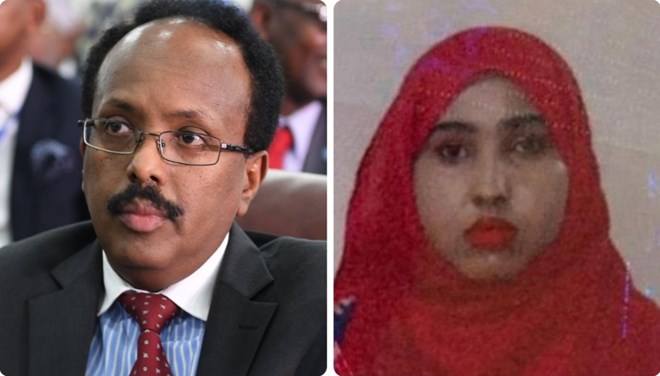
Source: Hiiraan Online, Isniin, September, 13, 2021 (HOL) – Madaxweynaha dowladda Soomaaliya Maxamed Cabdullaahi Farmaajo ayaa magacaabay guddi qaran oo baaritaan ku sameeynaya kiiska Ikraan Tahliil Faarax.
ⓘMadaxweyne Farmaajo ayaa magacaabay guddi uu guddoomiye u yahay Xeer Ilaaliyaha Guud ee Qaranka, ku xigeena uu ka yahay Xeer Ilaaliyaha Maxkamadda Ciidamada Qalabka Sida.
“Madaxweynaha Jamhuuriyadda Federaalka Soomaaliya Mudane Maxamed Cabdullaahi Farmaajo oo mudnaan siinaya in baaritaan daah furan lagu sameeyo Kiiska Sarkaal Ikraan Tahliil Faarax ayaa u magacaabay Guddi Qaran oo ay hoggaaminayaan Xeer Ilaaliyaha Guud ee Qaranka iyo Xeer Ilaaliyaha Guud ee Maxkamadda Ciidamada Qalabka Sida” ayaa lagu yiri qoraal lagu daabacay bogga Madaxtooyada Soomaaliya.
Magacaabista guddigan uu magacaabay madaxweyne Farmaajo ayaa waxay imaaneysa xili isla kiiskan uu guddiga baaritaanka u magaacabay ay isaga iyo Raysal wasaarahiisa isku khilaafeen, lamana oga waxa xiligaan kusoo dhaliyay in madaxweyne Farmaajo uu magacaabo guddigan sameynaya baaritaanka qaran ee kiiska Ikraan Tahliil Faarax.
Hoos ka akhriso qoraalka kasoo baxay Madaxtooyada Soomaaliya.
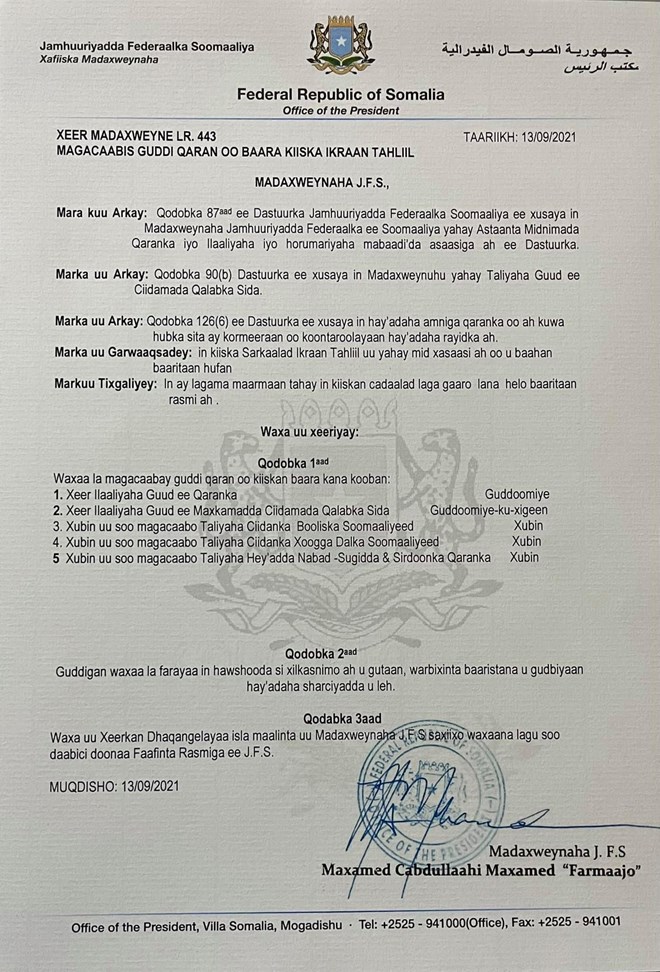
Jamaal Cali Cabdi, Hiiraan Online
jamaal@hiiraan.com
Shun political discord for stability, UN tells Somali leaders
Shun political discord for stability, UN tells Somali leaders




Source: Xinhuanet, Monday September 13, 2021
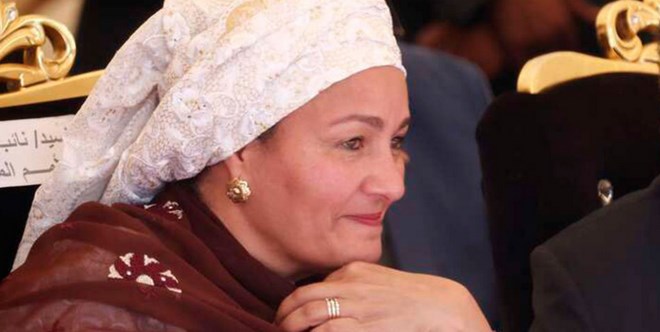
United Nations Deputy Secretary-General Amina J. Mohammed on Sunday called on Somali political leaders to shun political discord which may jeopardise the gains made in the country.
Mohammed, who made a day-long visit to Mogadishu, said Somalia has achieved considerable momentum with its ongoing electoral process and urged the leaders to de-escalate the political tension in the country.
“I was encouraged to hear the commitment from all I met with to ensure that this momentum is sustained and that critical elections move forward as scheduled,” said the UN official who also met President Mohamed Farmaajo and Prime Minister Mohamed Roble.
“I have confidence in Somalia’s leadership to de-escalate any tensions and avoid action that could lead to violence and further delay the elections or undermine its credibility,” she added.
Elections
advertisements
Somalia is currently holding elections for its Upper House and is preparing for elections for its Lower House.
The international partners have been heavily engaged in supporting national efforts to advance the country’s elections.
During the visit, Mohammed expressed solidarity with Somali women’s calls for full and equal participation in political life, and expressed the support of the international community for timely, inclusive, peaceful and credible elections.
She highlighted the country’s parliamentary elections as an opportunity to build on the progress made in women’s political participation and emphasised that women’s full inclusion in all sectors of society will contribute to greater resilience, peace, and stability.
“Somalia achieved a milestone at its last elections in 2016/17 with 24 per cent of parliamentary seats filled by women, and I am hopeful that the country will build on this by expanding women’s participation even further — ensuring the 30 per cent quota is met is an important first step to full representation and an inclusive society. The peace dividend will not happen without women,” Mohammed said.
PM Roble orders finance ministry not to disburse funds without his approval
PM Roble orders finance ministry not to disburse funds without his approval




Source: Sunday September 12, 2021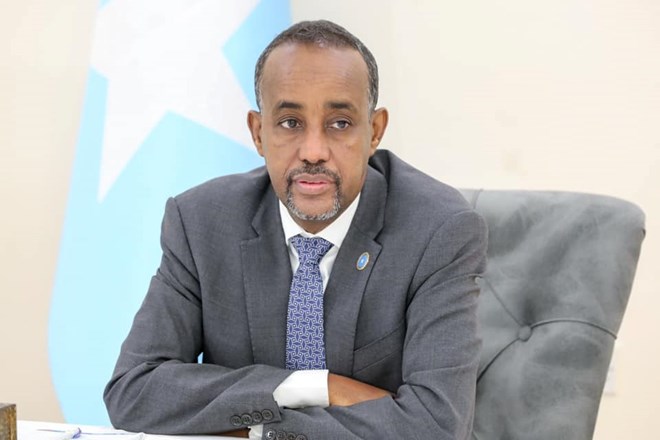
Mogadishu (HOL) – Prime Minister Mohamed Hussein Roble has issued a new directive to the Somali finance ministry on Sunday not to disburse any funds without his consent during this transition period.
In a letter addressed to the heads of the Ministry of Finance, the Central Bank Governor, and the National Treasurer, the Prime Minister instructed the ministry not to disburse any funds from the treasury without his signature.advertisements
The PM cited the IMF’s recent Special Drawing Rights (SDR) allocation – unprecedented in history- as the key motivator in his decision.
“Given the country’s transition and the need to pay more attention to the DDS disbursement process and the use of the IMF’s SRD’s, the FGS Prime Minister instructed the Ministry of Finance and those addressed in this letter that no expenses, of any kind, may be made without the consent of Somali PM.”
Somalia was allocated $US156.6 million worth of SDRs under the IMF plan to boost liquidity in the global financial system.
The Prime Minister said that the Ministry of Finance could not withdraw any funds from Somalia’s allocation of IMF funds without his approval. He added that his office must clear all major expenses before approval.
“The salaries of soldiers and personnel, military rations, projects and any other expenses necessary for the service of the government, when the officials of the Ministry of Finance have performed their duties, must be approved by the Prime Minister before the ministry can make any payment.”
The letter ordered those addressed in the letter to “act accordingly,” noting that his directive would be in effect immediately and would be lifted at the end of the transition period.
The SDR is an international reserve asset created by the IMF in 1969 to supplement other reserve assets of member countries. The value of an SDR is based on a basket of the world’s five leading currencies – the US dollar, euro, yuan, yen and the UK pound. While it can’t be used as money, countries can trade their SDRs for hard currencies with other, typically wealthy, IMF members. SDRs are the IMF’s official unit of exchange.
The largest allocation of SDRs, equivalent to about US$650 billion, became effective on August 23.
The new SDRs were credited to IMF member countries in proportion to each country’s participation in the IMF capital. The amount typically correlated to their economies’ size.
The SDR allocation is not a loan and can be used freely to weather the global financial storm caused by the COVID-19 pandemic. The IMF’s Managing Director, Kristalina Georgieva, said it would provide regular updates on all SDR holdings, transactions, and trading to ensure accountability and transparency.
This latest directive comes on the heels of a failed meeting between the PM and the President aimed at solving the current constitutional crisis.
The PM chaired an NCC meeting on Sunday with Amina J Mohammed, the Deputy Secretary-General of the UN, to discuss the latest political standoff, the elections and the “peaceful and legitimate transition of power.”
The President also met with Mohammed during a meeting in Villa Somalia. Farmajo said that they discussed Sustainable Development Goals and the need for timely and inclusive polls.
Roble had previously warned that budgeting for the upcoming elections was scarce and was at the top of the agenda during last month’s NCC meeting between the Prime Minister and Somalia’s Federal Member States’ leaders.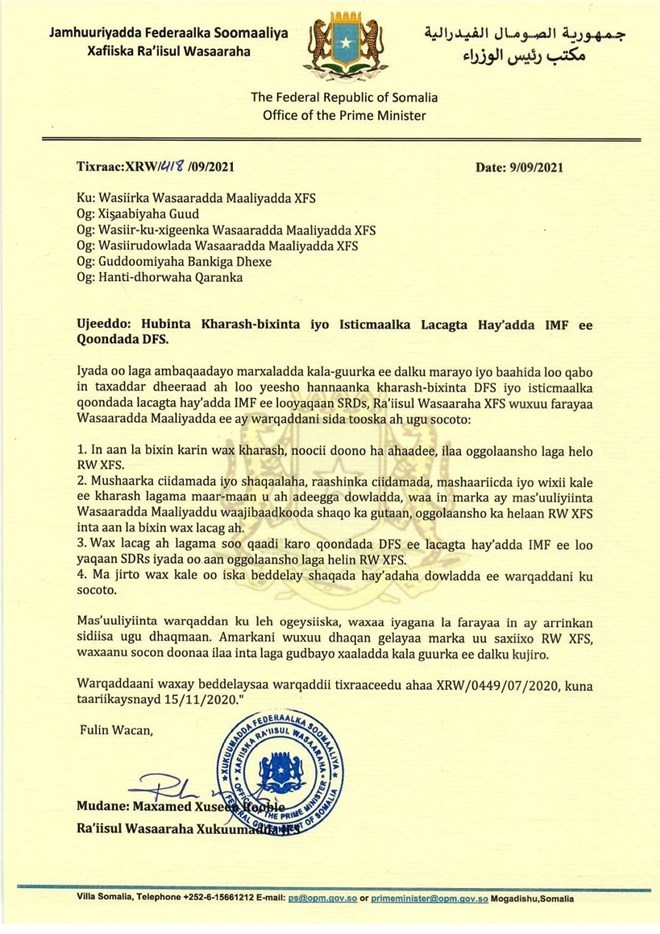
Somalia feud threatens to unleash renewed turmoi
Somalia feud threatens to unleash renewed turmoil




Source: AFP, Thursday September 9, 2021
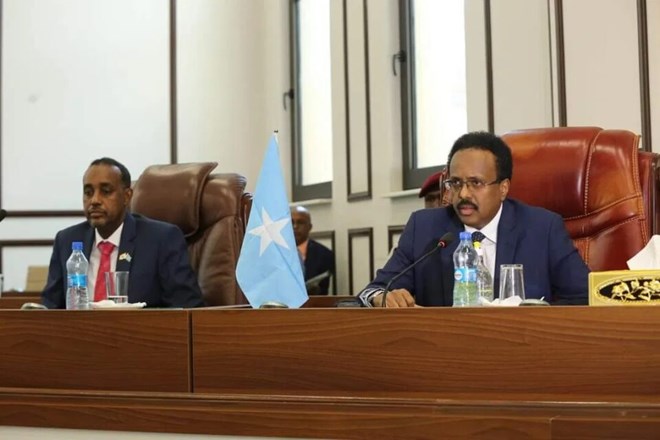
FILE PHOTO
With a long-running Islamist insurgency and elections delayed for months, Somalia is no stranger to instability, but the country now faces the risk of renewed violence because of an increasingly bitter stand-off between its president and prime minister.
Here is a look at why relations between Prime Minister Mohamed Hussein Roble and President Mohamed Abdullahi Mohamed, alias Farmaajo, deteriorated so quickly and what lies ahead for the volatile Horn of Africa nation.
Was their relationship always difficult?
Not quite. A Swedish-trained civil engineer, Roble was plucked out of political obscurity by the president, better known as Farmaajo, who appointed him premier last September.
The technocrat generally took a backseat to the politically savvy Farmaajo, who worked in the Foreign Affairs ministry and served as premier himself before becoming president.
After the head of state extended his mandate in April without holding elections, triggering the country’s worst bout of political violence in years, he turned to Roble to help defuse the situation by asking him to organise the parliamentary polls.
What went wrong?
As Roble’s profile rose, he began to challenge Farmaajo on several issues, angering the president.
He visited Kenya last month, flagging a thaw in diplomatic ties, days after Farmaajo banned government institutions or officials from entering into agreements with foreign countries or entities until elections were held.
Roble then took on Somalia’s powerful National Intelligence and Security Agency (NISA) last week, criticising its handling of a high-profile investigation into the fate of a 25-year-old officer, Ikran Tahlil, whose disappearance prompted an outcry.
Tahlil’s family has accused NISA of murdering her — a view backed by many Somalis who have taken to social media to denounce the agency and demand justice.
When Roble suspended the agency’s director, Fahad Yasin, a close associate of Farmaajo, the president reacted swiftly, first reinstating and then promoting his old friend to the position of national security adviser.
The prime minister responded by accusing Farmaajo of “obstructing” the probe, and said the developments signalled “a dangerous existential threat to the country’s governance system”.
Where do things stand now?
The public spat has raised tensions in Mogadishu, where military units close to Farmaajo’s office were seen stationed outside NISA headquarters Wednesday.
The infighting has also had a knock-on effect on various government bodies, with one NISA officer telling AFP that senior officials had apparently picked sides in the row.
A Ministry of Information staffer told AFP that journalists at state-run media outlets were being instructed not to broadcast messages from Farmaajo.
On Wednesday night, matters escalated further when Roble sacked Internal Security Minister Hassan Hundubey Jimale and replaced him with a Farmaajo critic, saying the move would “revitalise” the key ministry, which oversees all security, police and intelligence agencies.
The president wasted no time in firing back Thursday, calling the decision unconstitutional, while the dismissed minister accused Roble of dragging the country “into a new conflict”.
What lies ahead?
Many fear the spat will throw an already fragile electoral process into deeper peril.
The next phase of the election, which follows a complex indirect model of voting, is set to kick off for the lower house of parliament between October 1 and November 25.
But it is not clear when parliament will elect a new head of state.
“This conflict, if not resolved amicably, will complicate every other ongoing political effort including the election process, which will be delayed if not completely stopped,” Abdikani Omar, a former high-ranking civil servant, told AFP.
Roble has already accused Farmaajo of trying to reclaim “the election and security responsibilities” entrusted to him earlier this year.
Why does it matter?
With Al-Shabaab jihadists controlling large areas of the country, Somalia is in no position to cope with a full-blown political crisis.
Somalia’s intelligence agency is an essential weapon in its fight against the Al-Qaeda-linked insurgents, who will be quick to exploit any sign of weakness.
The militants have already waded into the row, issuing a swift — and unusual — denial when NISA said its young officer had been murdered by the group.
The international community is worried, with the United Nations, the African Union Mission in Somalia (Amisom), the United States, the European Union and East African bloc Igad among those urging the two men to stop bickering and focus on the country.
A decade after the Al-Qaeda-linked militants were ousted from Mogadishu, the government controls only a small portion of the country, with the crucial help of some 20,000 soldiers from Amisom.
“We saw back in April how quickly Mogadishu can become a theatre for opposing military forces amid a wider political breakdown,” said Omar Mahmood, a senior analyst at the International Crisis Group (ICG).
“Depending on how events unfold in the coming days, a repeat situation could be in the offing.”
BREAKING: President Farmajo reinstates Fahad Yasin, declares PM sacking “illegal
BREAKING: President Farmajo reinstates Fahad Yasin, declares PM sacking “illegal”




Source: Hiiraan Online, Monday September 6, 2021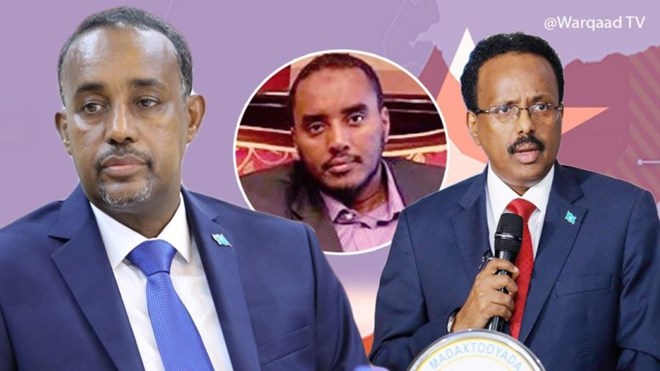
Mogadishu (HOL) – Somalia’s President Mohamed Abdullahi Farmajo issued a directive on Monday morning that declared Prime Minister Mohamed Hussein Roble’s dismissal of Somalia’s spy chief “illegal” and “unconstitutional.”advertisements
“The decision of the Prime Minister of the Federal Government of Somalia, His Excellency Mohamed Hussein Roble, is illegal and unconstitutional.”
The decree also reinstated Fahad Yasin as the director of the National Intelligence & Security Agency (NISA).
“The Director-General of the National Intelligence Agency, Mr. Fahad Yassin Haji Dahir, is instructed to continue to lead the National Security and Intelligence Agency, in accordance with the Constitution and the Presidential Decree.”
The decree from Villa Somalia came just hours after PM Roble dismissed Fahad over his agency’s handling of the disappearance of Ikran Tahlil.
The PM appointed a former spy chief, Lieutenant-General Bashir Mohamed Gobe as the agency’s interim director.
https://www.facebook.com/plugins/post.php?href=https%3A%2F%2Fwww.facebook.com%2FVillaSomaliaOfficial%2Fposts%2F4355359337881844&show_text=true&width=500
President Farmajo instructed NISA to present the National Security Council (NSC) with its report at the next meeting. The President did not give a specific date on when that meeting would be held. He also directed PM to continue managing the upcoming elections.
“The President of the Federal Republic of Somalia instructs Prime Minister Mohamed Hussein Roble and the Council of Ministers to fulfill their responsibility to complete the electoral process effectively.”
President Farmajo conceded the election management duties to PM Roble in early May after intense domestic and international pressure forced the President to walk back an attempt to extend his mandate by two years.
The Council of Presidential Candidates supported the PM’s dismissal of Fahad Yasin as the head of NISA, accusing Farmajo of prioritizing his personal relationship with the spy chief over his duties to protect the constitution.
Both leaders have cited the same articles in Somalia’s Provisional Constitution to legally justify their actions.
It is not the first time PM Roble has directly clashed with the President over his legal powers and duties. In early August, the PM rebuffed a presidential decree issued by Farmajo that ordered all federal government officials to disengage from any agreements until a new government was seated.
Both Somalia’s President and its Parliament are without a constitutional mandate.
The PM ordered his cabinet to proceed with business as usual.
Observers worry whether this latest twist could trigger a second constitutional crisis in 2021.
BREAKING: PM sacks Fahad Yasin after meeting with Ikran Tahlil’s family
BREAKING: PM sacks Fahad Yasin after meeting with Ikran Tahlil’s family




Source: Hiiraan Online, Sunday September 5, 2021
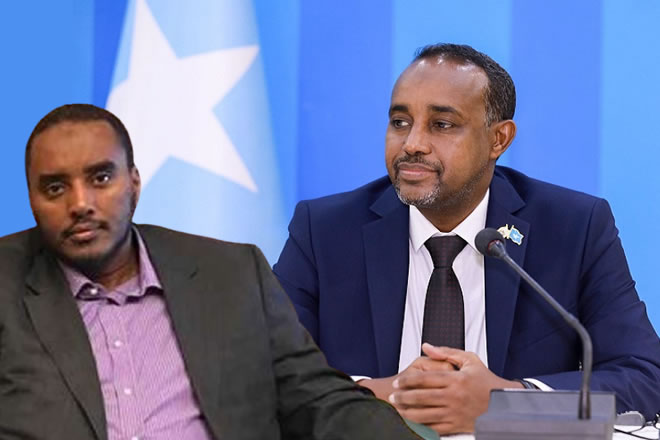
Mogadishu (HOL) – Somalia’s Prime Minister, Mohamed Hussein Roble, has sacked Fahad Yasin, Director General of the National Security and Intelligence Agency (NISA), on Sunday and has appointed Bashir Mohamed Gobe as the agency’s interim director.advertisements
The sacking comes barely a day after the PM gave Fahad Yasin a 48hr ultimatum to produce a report on the death of a female spy, Ikran Tahlil.
Fahad Yasin reportedly called for a National Security Council shortly before he was sacked so he could properly explain how Ikran Tahlil went missing.
Tahlil was a cybersecurity expert with NISA. The intelligence agency announced on Friday that Ikran was murdered by the militant insurgency group Al-Shabaab.
Al-Shabaab immediately denied the government’s claim.
The PM met with Tahlil’s family earlier on Sunday, including her mother Qali Mohamud Guhad, and reportedly promised the family justice.
The PM”s directive instructs everyone at NISA to assist Gobe as he takes over leadership. The PM also asked Somalia’s Attorney General, Suleyman Mohamed, to open a formal investigation into Ikran’s demise.
Security Council extends mandate of UN Assistance Mission in Somalia
Security Council extends mandate of UN Assistance Mission in Somalia




Source: Xinhua net, Tuesday August 31, 2021
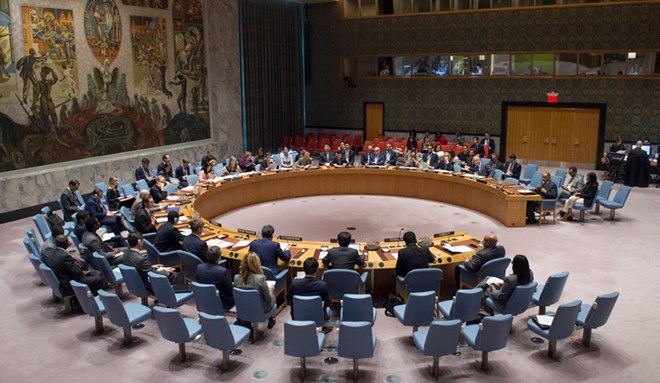
The Security Council on Monday adopted a resolution to extend the mandate of the UN Assistance Mission in Somalia (UNSOM) for nine months, till May 31, 2022.
Resolution 2592, which was adopted unanimously by the 15-member council, strongly condemns continued attacks by the terrorist group Al-Shabaab and urges the Somali authorities, the African Union Mission in Somalia, and the United Nations to work closely on strengthening safety and security of the UN and African Union facilities and staff.
advertisements
It requests UNSOM to maintain and strengthen its presence across Somalia, subject to UN security requirements and as the security situation allows.
The resolution expresses the Security Council’s deep appreciation of UNSOM’s support to the Somali federal government, in particular concerning the development of inclusive politics and preparations for the elections in 2021, the constitutional review process, mediation, prevention and resolution of conflicts, the development of a federated police and justice system, strengthening the rule of law and security-sector reform, and coordinating capacity-building support on anti-corruption issues.
It recalls the need for Somalia and its partners to take a coordinated and cohesive approach toward Somali-led political and security reforms.
The resolution decides that UNSOM should continue to coordinate UN efforts, maximizing joint approaches and joint programming in relevant areas, in full cooperation with the federal government and the federal member states.
It calls on the federal government and the federal member states to organize free, fair, credible and inclusive elections in line with the Sept. 17, 2020, and May 27, 2021, agreements without further delay, and urges the federal government and the federal member states to finalize outstanding preparations to this end.
It calls on the federal government and the federal member states to enhance, as a matter of urgency, broad-based consultations and consensus-building through consultative mechanisms at all levels and with the two houses of parliament on national priorities.
The resolution expresses the Security Council’s concern about all violations of international humanitarian law and violations and abuses of human rights, including those involving sexual and gender-based violence in conflict.
It further calls on all parties to comply with their obligations under international law concerning the protection of civilians and civilian objects, and reiterates the urgent and imperative need to hold accountable all those responsible for violations of international humanitarian law and violations and abuses of human rights.
Egypt-Somalia relations: All eyes on Mogadishu
Egypt-Somalia relations: All eyes on Mogadishu




Source: ahramonline, Sunday August 29, 2021
By Dina Ezzat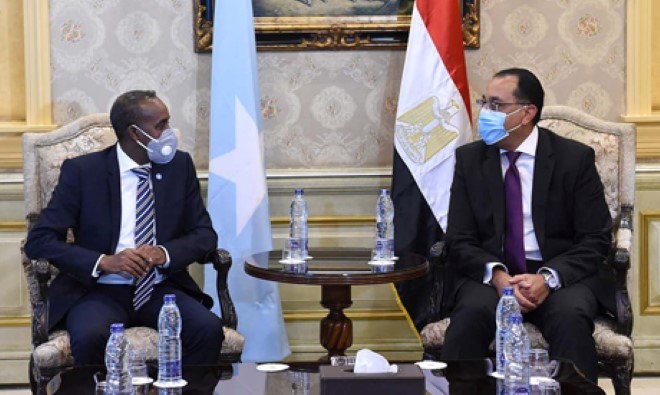
As part of Egypt’s strategy to engage further with the African states, especially those in the east of the continent and around the Nile Basin, Cairo unrolled the red carpet for Prime Minister of Somalia Mohamed Hussein Roble during a visit to Egypt this week.
Roble was in town for a three-day visit and was received by Prime Minister Mustafa Madbouli who held two rounds of talks, one attended by both prime ministers and one also attended by Egypt’s ministers of foreign affairs, education and health and their visiting Somali counterparts.
advertisements
Roble’s visit is the third by a high-ranking Somali official to Cairo in a year, with previous visits having included one by the Somali foreign minister.
During his visit, Roble was received by the Grand Imam of Al-Azhar Sheikh Ahmed Al-Tayeb. Al-Azhar operates a prominent institute in Mogadishu and offers scholarships to Somali students.
“Education has always been one of the most prominent areas of cooperation between our two countries. For decades, Egypt, through the national education system and through Al-Azhar, has provided educational support to Somalia,” Mohamed Nasr, the Egyptian Ambassador in Mogadishu, said.
He added that this support had always been highly appreciated by the Somali people, who thought fondly of Egypt as an education destination.
“Actually many prominent Somali figures received their education in Egyptian schools in Somalia, or by Egyptian teachers, or even went to Egyptian universities,” Nasr said.
Roble himself studied for a few years in Egypt, and one of the things that was agreed during his talks in Cairo was to boost educational cooperation between the two countries, Nasr said.
In the years prior to the outbreak of over a decade-long civil conflict in Somalia in the early 1990s, Egypt had run a school in almost every region of the country. In Mogadishu, it ran a prominent school that carried the name of former president Gamal Abdel-Nasser, whose memory is cherished on the continent 50 years after his death.
In the 1990s, Egypt tried to put an end to the devastating civil conflict and hosted several rounds of political dialogue in pursuit of reconciliation. However, with so many political developments around the Middle East, Cairo got a lot more focused on the Arab problems, while Somalia was falling into disrepair.
With the end of the conflict in Somalia, Egypt tried to pick up the pieces of its educational presence in this important country in the Horn of Africa. “Starting in 2015, Egypt has been systematically working on consolidating its relations with Somalia,” Nasr said.
Roble’s visit, he added, was designed to underline the commitment of both sides to working together towards stronger ties. “I think part of what makes our relations so important is that they never overshadowed the many other issues that we are both interested in,” Nasr said.
Roble’s visit comes a few months ahead of the national elections that are scheduled tentatively for October this year in Somalia. The elections, earlier announced by Roble, are meant to spare the country from the possible political crisis that has been in the making since Somali President Mohamed Abdullahi Farmaajo attempted to delay these elections for two years.
The attempt stirred political unrest, and Roble stepped in to offer a political compromise through the elections. He has since been at the head of the process leading to the elections.
Nasr said that Egypt was not planning to get involved in internal Somali affairs. What Egypt was keen on was boosting development in Somalia and aiding in political coordination, he added.
According to Amira Abdel-Halim, lead researcher on the Horn of Africa at the Al-Ahram Centre for Political and Strategic Studies in Cairo, “in the final analysis the outcome of these elections is important for Egypt in the sense that anything that influences the stability of Somalia is important for Egypt.”
For Egypt, the Horn of Africa is a national security concern, especially vis-à-vis the Red Sea. It is also close to the Nile Basin.
These have always been two strategic areas of concern for Egypt, Abdel-Halim said, adding that “the Red Sea is a very important region for Egypt, and it has become highly militarised with many foreign countries building military or logistics bases in the countries of the Horn of Africa.”
In addition to Turkey — that has become during the past two decades a key player in this region and other parts of Africa including the equally crucial Sahel and Sahara zone — other foreign countries that have some sort of presence in the Horn of Africa include, Italy, US, France, Russia, China and the United Arab Emirates.
Egypt, government officials say, is not planning to press its interests in the region at the expense of members of the region, but it cannot look the other way when foreign powers, including Arab and non-Arab states, are expanding their presence.
For example, Qatar, for several years a political foe of Egypt and both the United Arab Emirates and Saudi Arabia, who have had alliances with Egypt, acted during the past decade to expand in the region, Abdel-Halim said.
Egypt, she added, “has been legitimately trying to balance this situation to make sure that its strategic interests around the Red Sea and in the Nile Basin are not compromised”. This reach-out, she noted, has been trying to cover all the countries of this region at the highest level possible.
advertisementsShe added that winning Somalia over is crucial both for the security of the Red Sea and also in view of the current conflict with Ethiopia over the Grand Ethiopian Renaissance Dam (GERD) was also important for Egypt.
Ethiopia has often tried to “undermine Somalia,” she said, adding that this had been “either through military interventions or political maneuvering”.
According to Abdel-Halim, Ethiopia was “largely” to blame for the radicalisation of the Al-Shabab movement in Somalia. “Originally Al-Shabab was stimulated to resist Ethiopia’s military and political presence in Somalia and along the road the movement got radicalised,” she said.
Today, Abdel-Halim argued, helping Somalia stand on its own two feet is crucial to helping it face up to the attempts of foreign countries to intervene in its affairs, “Ethiopia or any other country”.
“Sparing Somalia from the conflicting agendas of other countries is a crucial first step for stability since the country has suffered a lot due to repeated interventions from countries in and out of the region,” she said.
“I think there is an understanding in Somalia, both at the official and public levels, that Egypt is not trying to take control of the political will of Somalis,” Abdel-Halim said. Still, she added, it is also understood and accepted that Egypt has some crucial interests that it would wish Somalia to accommodate, including those related to Red Sea security and the GERD conflict.
According to Nasr, coordination and consultations between the two countries will continue, covering all aspects of bilateral and regional issues.
Somali police boss Abdi Hijaar officiates graduation of female elite forces in Turkey
Somali police boss Abdi Hijaar officiates graduation of female elite forces in Turkey




Source: Sunday August 29, 2021
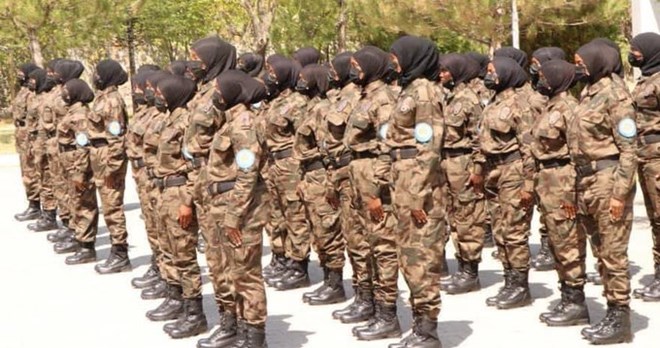
MOGADISHU (HOL) – Somali police chief Abdi Mohamed Hijaar Saturday officiated a commencement ceremony of 49 female elite forces following their specialized training in Turkey.
The officers drawn from the Harama’ad police unit graduated from a Turkish training academy.advertisements
The police commandant said the group was the last group to have completed the advanced training.
“This training is part of a special operations training. This batch of female officers is the last to complete this training, ”said Hijaar.
Besides the Harama’ad police unit, Turkey also trains the Gorgoor Battalion of the Somali National National Army.
Turkey also operates a military training academy in Mogadishu, which trains army recruits.
The female officers are expected to return home soon.
Ethiopia Moves Closer to China, Away from US
Ethiopia Moves Closer to China, Away from US
Source: Xinhua published on 26 August 2021 an article titled “China to Strengthen Ties with Ethiopia, Further Vitalize China-Africa Cooperation: FM.”
China and Ethiopia agreed to increase their strategic partnership in a phone call between Ethiopia’s Deputy Prime Minister Demeke Mekonnen and China’s Foreign Minister Wang Yi. They also opposed “Western interference in other countries’ internal affairs under the excuse of human rights.”

Labels: China, COVID-19, Demeke Mekonnen, Ethiopia, foreign policy, human rights, US, Wang Yi
Ethiopia-Turkey Ties Strengthen
Ethiopia-Turkey Ties Strengthen
Source: Al-Monitor published on 18 August 2021 an article titled “Turkey Views Ties with Ethiopia as Key to Influence in Africa” by Fehim Tastekin.
Ethiopia seeks Turkish support to offset Arab support for Egypt and Sudan on the dispute over the Grand Ethiopian Renaissance Dam and the ability to purchase drones from Turkey. Turkey sees Ethiopia as a gateway to Sub-Saharan Africa and an ally in its differences with Egypt.
Labels: Abiy Ahmed, drones, Egypt, Ethiopia, GERD, Gulen Movement, investment, Recep Tayyip Erdogan, Sudan, trade, Turkey
Ethiopia announces fresh delays to polls
Ethiopia announces fresh delays to polls



Source: AFP, Friday August 27, 2021
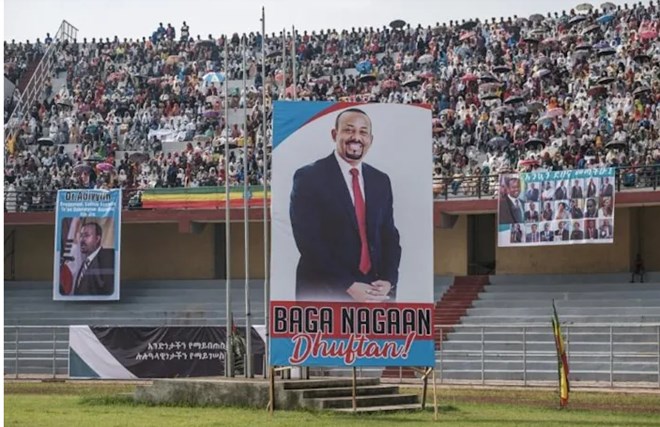
Ethiopian authorities have postponed polls in around a fifth of the country’s constituencies, extending a months-long delay which prevented citizens from voting in a June election due to ethnic violence and logistical problems.
Prime Minister Abiy Ahmed’s party won a landslide in the June vote, despite a brutal war in the northern region of Tigray, which was among the areas where elections did not take place.
A second batch of polling in one-fifth of the country’s 547 constituencies was scheduled for September 6, but will now take place on September 30, the National Electoral Board of Ethiopia (NEBE) announced in a statement late Monday.
The decision followed a meeting with politicians, who told NEBE officials that “considering the current situation the country is in, it’s not appropriate to hold elections currently.”
NEBE said voting will take place on September 30 in the Somali, Harari and Southern regions, alongside a separate referendum on proposals to create a new South West region.
But no election date has been set for Tigray, where fighting between Abiy’s forces and the Tigray People’s Liberation Front (TPLF) has killed thousands of people and pushed hundreds of thousands into famine-like conditions.
advertisementsEach side has accused the other of preventing aid convoys from reaching those in need as the violence expands to the neighbouring Amhara and Afar regions.
Abiy’s landslide win in June came as the 2019 Nobel Peace Prize winner saw his global reputation plummet, as Tigray lurched deeper into a humanitarian crisis.
His Prosperity Party won 410 seats in the federal parliament out of 436 where elections were held, according to results issued by NEBE, while opposition parties and independent candidates won a small number of seats.
The vote was meant to affirm a promised democratic revival in Africa’s second-most populous nation, with Abiy vowing a clean break with repression that tarnished past electoral cycles.
But opposition candidates complained of a tilted playing field in some areas, with two prominent opposition parties in Oromia, Ethiopia’s largest region, pulling out entirely from the polls, saying their candidates had been arrested and offices vandalised.
NEBE noted that some constituencies experienced “improper arrests,” voter intimidation and “harassment” of observers and journalists, and said it had recorded several killings in the runup to the vote in Oromia, the most populous region
AU names Obasanjo High Representative for Horn of Africa
AU names Obasanjo High Representative for Horn of Africa




Source: The EastAfrica, Friday August 27, 2021
By TESFA-ALEM TEKLE
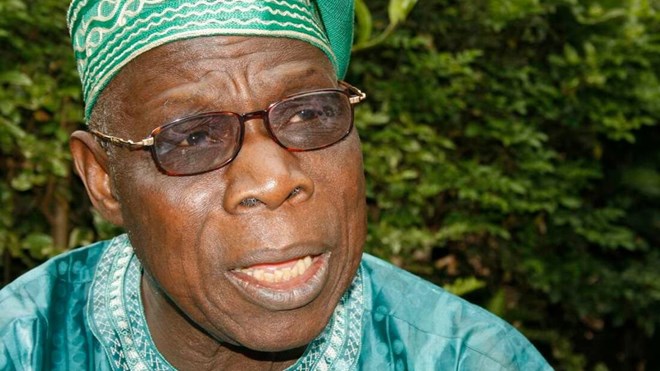
Nigeria’s former president Olusegun Obasanjo named African Union High Representative for the Horn of Africa. PHOTO | FILE | NMG
The African Union (AU) has appointed Nigeria’s former president Olusegun Obasanjo as its high representative for the Horn of Africa’s region.
“This decision is part of the African Union’s drive to promote peace, security, stability and political dialogue all over the Horn of Africa region,” Moussa Faki Mahamat, Chairperson of the AU Commission, said in a statement on Thursday.advertisements
“Specifically, the High Representative will intensify engagements with all relevant political actors and stakeholders in the region towards entrenching durable peace and stability within the Horn of Africa.”
The Chairperson of the AU Commission highly appreciated Obasanjo for accepting what the AU said was for “this strategic political assignment in the collective interest of the continental bloc.”
“The former Nigerian leader brings with him very rich political experience, and impeccable credentials of keen commitment to the lofty ideals of Pan-Africanism and regional integration and cooperation, as well as a deep knowledge of the current situation in the Horn of Africa,” the statement said.
The new appointment comes as the volatile Horn of Africa region experiences conflict and crises.
An ongoing nine-month old civil war in Ethiopia’s Tigray region has spilled over to other regions of the country.
Billene Seyoum, the spokesperson of the Ethiopian Prime Minister’s office, on Thursday told reporters that the Tigray conflict, which has spread to Afar and Amhara regions, has led to almost half a million people displaced.
Obasanjo’s appointment also comes as Somalia and its international partners have failed to curtail a new rise of Al-Shabaab terrorist group insurgency.
Born on March 5, 1937, in Abeokuta, Ogun State, South Western Nigeria, Obasanjo served as president of Nigeria, Africa’s most populous nation, from 1999 to 2007.
Mr Obasanjo has also been involved in international mediation efforts in Angola, Burundi, Namibia, Mozambique and South Africa.
In 2008, the United Nations Secretary-General, Ban Ki-moon, appointed Mr Obasanjo as his Special Envoy to the Great Lakes region, where he has played an integral part in mediation efforts in the eastern Democratic Republic of the Congo.
Grand Strategies Don’t Work in Somalia
Grand Strategies Don’t Work in Somalia
Source: African Arguments published on 18 August 2021 a commentary titled “Why Somalia’s Grand Strategies Aren’t Working” by Liban Obisye and Liban A. Hussein.
Grand strategies for combatting al-Shabaab are not based on the real capabilities of Somali security forces and available resources. International partners propose grand schemes that are overly ambitious and lack local credibility.

Labels: al-Shabaab, AMISOM, Galmudug, security, Somalia
Future of African Union Force in Somalia
Future of African Union Force in Somalia
Source: The Royal United Services Institute published on 10 August 2021 an analysis titled “The African Union Intervention Force Will Stay in Somalia, But with Whose Troops?” by Colin Robinson.
It is not realistic to pull all AMISOM troops out of Somalia, leaving the country at the mercy of al-Shabaab. The question is which African troops are prepared to remain.

Labels: al-Shabaab, AMISOM, AU, Burundi, Djibouti, Ethiopia, Kenya, peacekeeping, SNA, Somalia, Uganda
Somaliland’s Followup after Successful Elections
Somaliland’s Followup after Successful Elections
Source: The International Crisis Group (ICG) published on 12 August 2021 an analysis titled “Building on Somaliland’s Successful Elections.”
Although long delayed, Somaliland held successful elections in May and August. The ICG argues, however, that there must be renewed efforts to include under-represented communities going forward.

Labels: civil society, elections, gender, Guurti, House of Representatives, Kulmiye, parliament, police, Somaliland, UCID, Waddani party
Future of African Union Force in Somalia
Future of African Union Force in Somalia
Source: The Royal United Services Institute published on 10 August 2021 an analysis titled “The African Union Intervention Force Will Stay in Somalia, But with Whose Troops?” by Colin Robinson.
It is not realistic to pull all AMISOM troops out of Somalia, leaving the country at the mercy of al-Shabaab. The question is which African troops are prepared to remain.

Labels: al-Shabaab, AMISOM, AU, Burundi, Djibouti, Ethiopia, Kenya, peacekeeping, SNA, Somalia, Uganda
Sudan vows to support peace efforts in Somalia
Sudan vows to support peace efforts in Somalia

Source: Xinhuanet, Sunday August 22, 2021
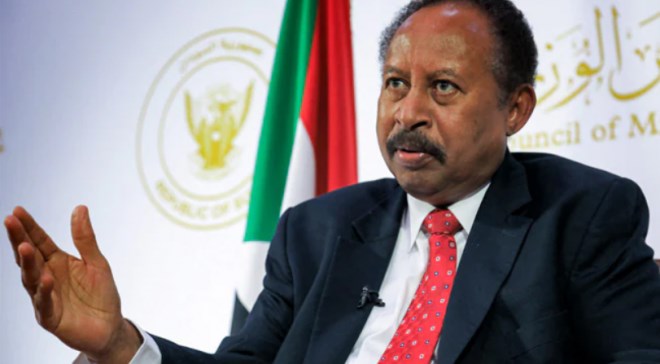
KHARTOUM, Aug. 20 (Xinhua) — Sudan on Friday vowed to support the efforts to achieve peace and stability in Somalia in cooperation with all Somali parties and the regional and international partners.
advertisements
Sudan welcomed the recent agreement reached between the African Union (AU) Commission and the federal government of Somalia to extend the mandate of the African Union Mission in Somalia (AMISOM), said Sudan’s foreign ministry in a statement.
The ministry stressed AMISOM’s important role in pushing the peace efforts in Somalia since its deployment.
The statement further pointed to the importance of supporting the federal government of Somalia to implement the national security strategy, conduct training and build the Somali security capabilities to actively contribute to ensuring sustainable security and stability in Somalia.
On Thursday, the AU announced that it reached a deal with the federal government of Somalia to extend the mandate of AMISOM which was established in 2007.
The AMISOM is set to gradually hand over the security responsibilities to the Somali security forces. Enditem
Sudan’s premier says will keep pushing for peace in Ethiopia
Sudan’s premier says will keep pushing for peace in Ethiopia




Source: Monday August 16, 2021
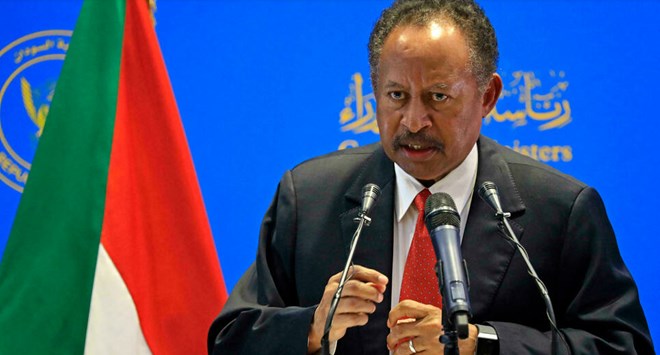
Khartoum will press ahead with efforts to ensure stability in Ethiopia, the Sudanese premier said Sunday, as its neighbour grapples with grinding conflict in its northern Tigray region.
Prime Minister Abdalla Hamdok said Sudan had reached out to all sides as part of a push to end the conflict.
“We will continue to exert all efforts for Ethiopia to become stable, unified and secure,” Hamdok told a press conference in Khartoum.
advertisements
Northern Ethiopia has been wracked by fighting since last November, when Prime Minister Abiy Ahmed sent troops to topple the Tigray People’s Liberation Front (TPLF), the region’s then ruling party.
Tens of thousands of Ethiopians have fled to refugee camps in Sudan, to escape a conflict that the UN says has pushed 400,000 people into famine-like conditions.
Last week, Sudan said it recalled its ambassador to Ethiopia for “consultations” after Addis Ababa spurned a push by Khartoum to help resolve the conflict.
Earlier this month, Ethiopia said its trust in some of Sudan’s leaders had been “eroded”, and accused the Sudanese army of launching an “incursion” into Ethiopian territory.
Relations between Khartoum and Addis Ababa have also soured over the contested border region of Fashaga, a fertile strip long cultivated by Ethiopian farmers, but claimed by Sudan.
The tensions come at a delicate time between the two countries, which along with Egypt have been locked in inconclusive talks over the Grand Ethiopian Renaissance Dam on the Blue Nile River.
Downstream nations Egypt and Sudan both fear the mega-dam threatens waters they depend on.


